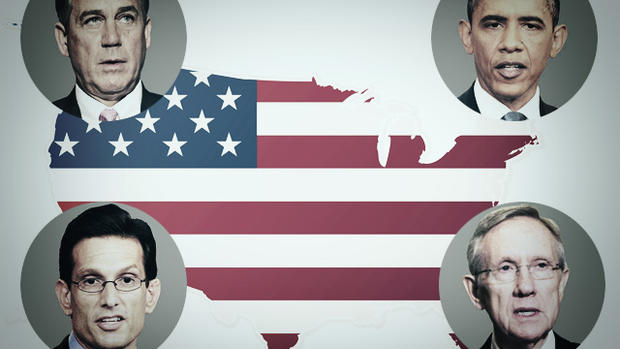Is August 2 really the debt D-day?
Updated at 3:50 p.m. ET
The Obama administration and several economists have warned that the U.S. risks defaulting on its loans and spurring worldwide economic catastrophe if the debt ceiling -- the legal limit the U.S. is allowed to borrow -- isn't increased by August 2.
The White House and the Treasury Department said today they're standing by that assessment, even as economic analysts say the government may have a grace period of at least a week to pay its bills.
White House Press Secretary Jay Carney reminded reporters Tuesday that the government actually hit its $14.3 trillion debt ceiling in mid-May, but the Treasury "exercised all the wiggle room available" to keep borrowing for as long as possible. By August 2, however, that wiggle room will be gone, he said, and the government will no longer have the authority to borrow money.
"That's not a guess. That's not a political opinion. It is the judgment of career analysts at the Treasury Department," Carney said. "We give up our borrowing authority without action by Congress. And the result of that risks default for the United States for the first time in our history, as we face the reality that we take in only 60 cents for every dollar we owe."
He added the White House is confident Congress will raise the debt ceiling and avoid that scenario.
Barclays is one of multiple banks to point out recently that the Treasury should have enough cash on hand to pay its bills at least about a week past August 2.
With that scenario in mind, a group of conservative lawmakers today were promoting a bill that would require Treasury Secretary Tim Geithner to prioritize payments for debt service, Social Security and military pay in the event the debt ceiling isn't raised by August 2.
The group of Republicans used their legislation to put any blame for a potential default squarely on the shoulders of the president.
"This president has created a mess," said Rep. Joe Walsh, R-Ill. "And we've offered to help him clean up this mess." But instead of agreeing to their ideas, Walsh continued, Obama has "stomped his feet and pointed his finger" like a child.
On the campaign trail in Iowa Tuesday, Republican presidential candidate Michele Bachmann said she will vote against raising the debt ceiling -- and she's skeptical of the August 2 deadline.
Earlier in the year, Bachmann said, the Treasury Department told Congress the debt ceiling had to be raised by March, and then it said by April.
"We've had subsequent dates throughout the year; the latest is August 2," she said. "Now there's talk in Washington today that date could be pushed out to August 10, potentially even September. No one knows what to believe what is coming out of this administration."
The White House and the Treasury Department, however, have been clear about their position. The Treasury Department today is reiterating the point that, regardless of the level of cash on hand on August 3, the only way to guarantee that all of the nation's bills get paid on that date and beyond is to raise the debt ceiling.
If Congress did fail to raise the debt ceiling by August 2, the Treasury Department could face its day of reckoning on August 4, when it will auction off $90 billion in debt. It's possible investors would stay away from the auctioning table, and the U.S. wouldn't be able to refinance that debt.
As former Federal Reserve Gov. Rick Mishkin told Mason, "There's a big cost to going up to the 11th hour because you start to spook markets."
Special Report: America's debt battle

